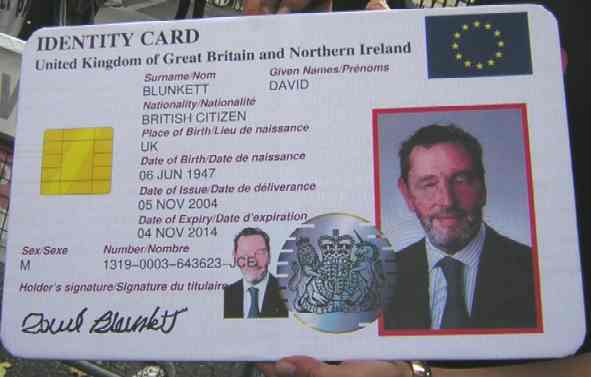
Identity Cards - background to the Bill, what's proposed, and what you can do:
|
|
Identity Cards - background to the Bill, what's proposed, and what you can do: |
History
The UK had compulsory ID cards during World War II, but abolished them in 1952, after strained relations between public and police.
In April 2000 - sixteen months before the New York disaster - EU ministers agreed on a programme called 'E-Europe' - in which public services were to be 'delivered electronically'. For instance a smart (microchipped) card, like London's Oystercard, would replace conventional tickets, and the Internet would be used to replace traditional forms of contact.
The UK 'E-Government' programme was announced with the latter in mind; and the first plans (2000) for the London Congestion Charge proposed smart cards for payment, but were later dropped as impractical.
Although the issue of universal smart cards was discussed, the Government waited until after '9/11' to make proposals. There was a run of three (rather suspect) 'public consultations' leading up to a predictable conclusion - after all, the decision had long been made:
The official Consultation on the Draft Bill in 2004 recorded 48% of respondents against proposals, with 31% for. (Other responses were either technical or uncommitted).
Cost
The Government is fond of claiming 'massive public support'. However, in a survey for the Detica consultancy MORI found only 19% were prepared to pay over £25 for their card.
Depending on the creative accounting method used, the price of an ID card is currently estimated to be between £35 and £85. Even the lower-paid will have to pay at least £10.
The cost could easily come to several times that, not to mention all the hidden costs that will be met from inflated passport fees and general taxation. The Financial Times reported that the Home Office currently estimates the scheme will cost £5.5billion over 10 years - that's roughly 50 new hospitals.
(The original estimate was that it would cost between £1bn and £3bn - see how estimates are prone to doubling!)
Claims
The Government claims that ID cards will cut illegal immigration, terrorism and other crime.
Both the Madrid bombers and New York hijackers had valid ID cards. David Blunkett admits that over a third of terrorists openly use their real identity.
Spain and Italy have ID cards, and both continuously experience illegal immigration. Both have announced amnesties for their many illegal immigrants. ID cards are hardly effective!
The idea that having to present an ID card at a police station would stop street crime does not hold water, any more than the need to produce a driving licence at a police station stops car theft.
Identity theft is a complex problem that is perhaps better tackled through a range of measures, such as better computer and personal information security practices. The biometric technology is not foolproof - note that the credit card companies adopted the simple 'Chip and PIN' system instead.
It could be argued that the greater the dependency on it, the greater the incentive to steal or forge an ID card.
ID cards are not inevitable. Although the Home Office reports that 21 out of 25 EU countries have them, countries with our 'common law' tradition like Australia and New Zealand have abandoned proposals after public opposition. Earlier this year, Canada dropped its plans for biometric cards.
The Identity Cards Bill
This was introduced in November 2004, shortly after a discredited rumour of an al-Qa'ida-type terrorist attack on London. The Government was accused in the press of trying to stir up public fears to gain acceptance for draconian measures.
The Bill certainly proposes some wide-ranging powers, but uses non-committal language. Everyone over 16 is liable to have to have an ID card. The Government can insist that children over 5 have one too. There will be a charge for being issued with an ID card:
It has been described as an 'electronic poll tax' and a 'tax on existence'. The Bill is non-committal over the level of charges. It is possible but uncertain that old age pensioners and the long-term sick might be exempted.
A population register (the National Identity Register, 'NIR') will hold a mass of information on us. Even if someone else has made an error on it, we are liable to pay for the card to be updated. Meanwhile we stand to lose access to the public services we've paid for.
Several new offences will be created. People can even be fined for not reporting a damaged card or for failing to notify a change of personal details.
A number of biometrics are proposed in the Bill, increasing the burden of administration. Far from improving public services, the ID card scheme might clog up police stations as law-abiding people are fingerprinted like criminals, and tie up police and court resources as people are fined for missing an appointment or a letter being lost in the post.
Although at first an ID card might not formally be 'compulsory' to carry or possess, however this can be changed readily. The Bill is non-committal on who will need to have an ID card - but it is safe to assume that any adult resident in the UK for more than three months will need a card if they wish to drive, use everyday public services, receive benefits; get a job, bank account or passport.
The Home Office admits that the card could be required when using commercial services, too. The population register (NIR) will contain an 'audit trail' - i.e. track us every time the card is used.
What can you do?
Index to ID cards feature
This fact sheet compiled: 6 December 2004